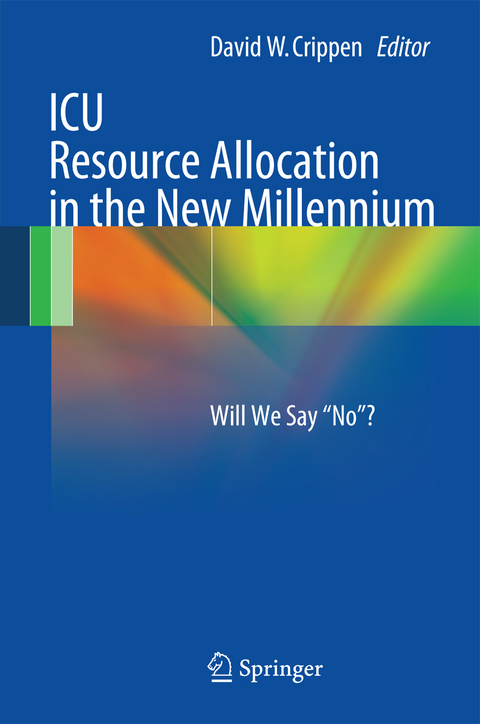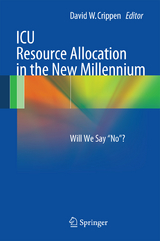ICU Resource Allocation in the New Millennium
Springer-Verlag New York Inc.
978-1-4614-3865-6 (ISBN)
Intensive care medicine is one of the fastest growing services provided by hospitals and perhaps one of the most expensive. Yet in response to the global financial crisis of the last few years, healthcare funding is slowing or decreasing throughout the world.
How we manage health care resources in the intensive care unit (ICU) now and in a future that promises only greater cost constraints is the subject of this book, the third in an informal series of volumes providing a global perspective on difficult issues arising in the ICU.
Taking 12 developed countries as their focus, leading experts provide a country-by-country analysis of current ICU resource allocation. A second group of experts use the chapters as a departure point to analyze current ICU resource allocation at the level of the global medical village. The process is repeated, but with an eye toward the future – first country by country, then at the global level – that takes into account initiatives and reforms now underway.
A fictional healthcare plan, the “Fair & Equitable Healthcare Plan,” is put forth to address weaknesses in existing approaches, and healthcare experts and ethicists are invited to respond to its often provocative provisions.
Itself structured as a dialogue, the book is an excellent way to start or to continue serious discussion about the allocation of ICU healthcare resources now and in the years ahead.
David W. Crippen, MD, FCCM is Professor of Critical Care Medicine at the University of Pittsburgh School of Medicine and Co-Director, Neurovascular ICU at the University of Pittsburgh Medical Center. He also holds secondary appointments as Professor in the Department of Emergency Medicine and in the Department of Neurologic Surgery. Dr. Crippen trained in general surgery, emergency medicine, and critical care medicine. He is a member of the Society for Critical Care Medicine, the European Society for Intensive Care Medicine, and the American College of Emergency Physicians. He is a Fellow of the American College of Critical Care Medicine, has been a Diplomate of the American Board of Emergency Medicine for 20 years, and received the European Diploma in Intensive Care Medicine. Dr. Crippen is a prolific writer in the medical and popular literature and a frequent speaker at international medical meetings. He moderates the Critical Care Medicine Internet Group (CCM-L) with more than 800 members around the world. Dr. Crippen plays lead and rhythm guitar for the rock group The CODES, has raced motorcycles on off-road and road racing circuits, and collects and tours the world on vintage motorcycles.
Foreword.- Introduction.- Part I. Contrasts in Global Health Care Resource Allocation.- 1. Australia: Where Have We Been?.- 2. Brazil: Where Have We Been?.- 3. Canada: Where Have We Been?.- 4. Germany: Where Have We Been?.- 5. India: Where Have We Been?.- 6. Israel: Where Have We Been?.- 7. Italy: Where Have We Been?.- 8. The Netherlands: Where Have We Been?.- 9. New Zealand: Where Have We Been?.- 10. South Africa: Where Have We Been?.- 11. United Kingdom: Where Have We Been?.- 12. United States, Private Practice: Where Have We Been?.- 13. United States, Academic Medicine: Where Have We Been?.- 14. Australia: Where Are We Going?.- 15. Brazil: Where Are We Going?.- 16. Canada: Where Are We Going?.- 17. Germany: Where Are We Going?.- 18. India: Where Are We Going?.- 19. Italy: Where Are We Going?.- 20. The Netherlands: Where Are We Going?.- 21. New Zealand: Where Are We Going?.- 22. South Africa: Where Are We Going?.- 23. United Kingdom: Where Are We Going?.- 24. United States, Private Practice: Where Are We Going?.- 25. United States, Academic Medicine: Where Are We Going?.- 26. Analysis of the Demand for Health Care in the Global Medical Village.- 27. First Critique of Buchman and Chalfin's Conclusions.- 28. Second Critique of Buchman and Chalfin's Conclusions.- 29. Third Critique of Buchman and Chalfin's Conclusions.- 30. Fourth Critique of Buchman and Chalfin's Conclusions.- Part II. The Fair and Equitable Health Care Act.- 31. The Fair and Equitable Health Care Act (FEHCA).- 32. First Critique of the Fair and Equitable Health Care Act (FEHCA).- 33. Fixing the Foundation of Critical Care at the End-stage of Life.- 34. Third Critique of the Fair and Equitable Health Care Act (FEHCA).- Part III. Legal and Nursing Viewpoints.- 35. Medical Judgment Versus Capitulation.- 36. Nursing Aspects of Inappropriate Patient Care.- Part IV. Conclusions.- 37. Where Is “Universal” Health Care Headed in the Global Village?.- 38. The New Shape Of Intensive Care In TheUnited States.- 39. Health Care in the Year 2050.- Afterword.
| Zusatzinfo | 9 Illustrations, color; 2 Illustrations, black and white; XXIV, 351 p. 11 illus., 9 illus. in color. |
|---|---|
| Verlagsort | New York, NY |
| Sprache | englisch |
| Maße | 155 x 235 mm |
| Themenwelt | Medizin / Pharmazie ► Gesundheitswesen |
| Medizin / Pharmazie ► Medizinische Fachgebiete ► Intensivmedizin | |
| Studium ► Querschnittsbereiche ► Prävention / Gesundheitsförderung | |
| Naturwissenschaften ► Biologie | |
| ISBN-10 | 1-4614-3865-9 / 1461438659 |
| ISBN-13 | 978-1-4614-3865-6 / 9781461438656 |
| Zustand | Neuware |
| Haben Sie eine Frage zum Produkt? |
aus dem Bereich




